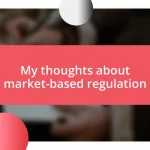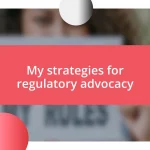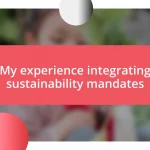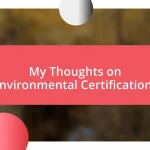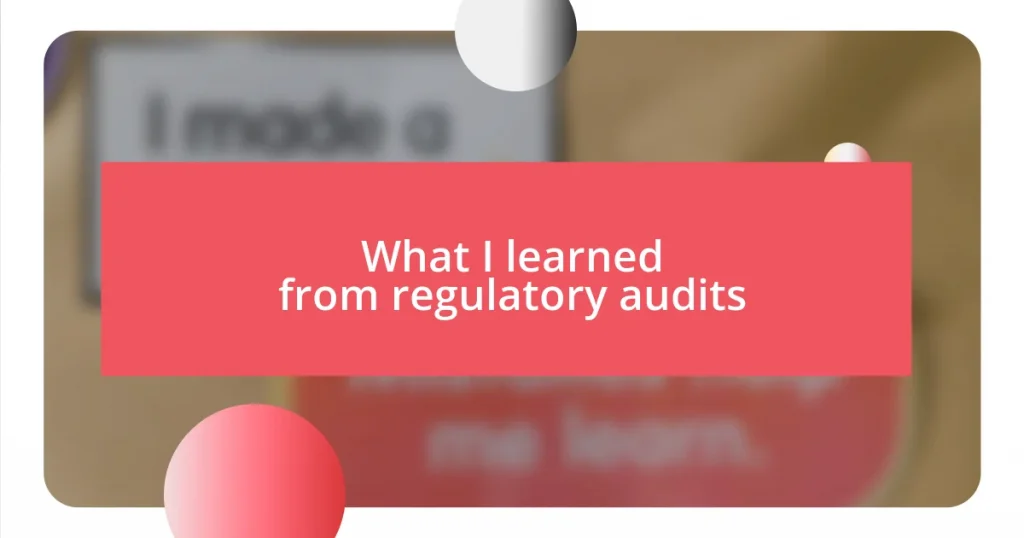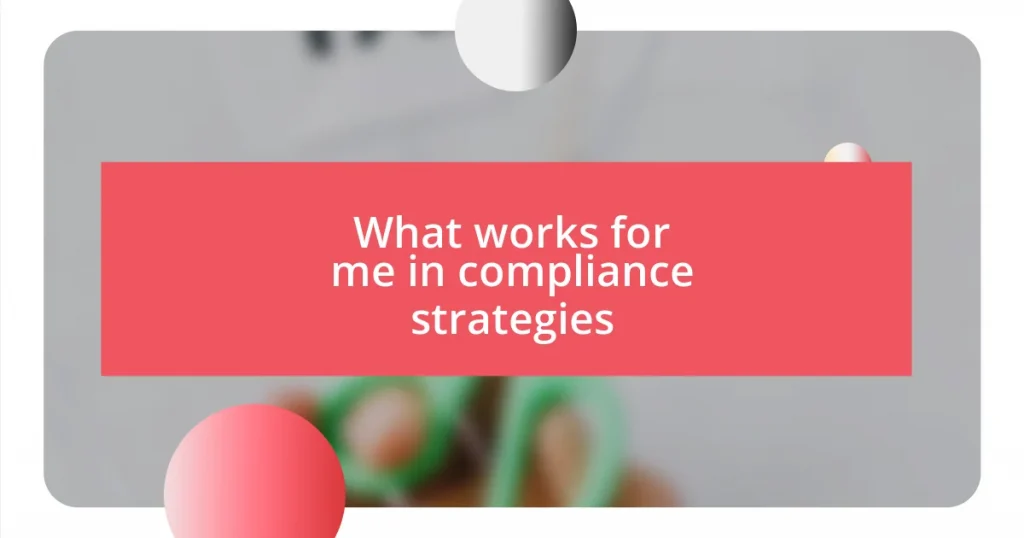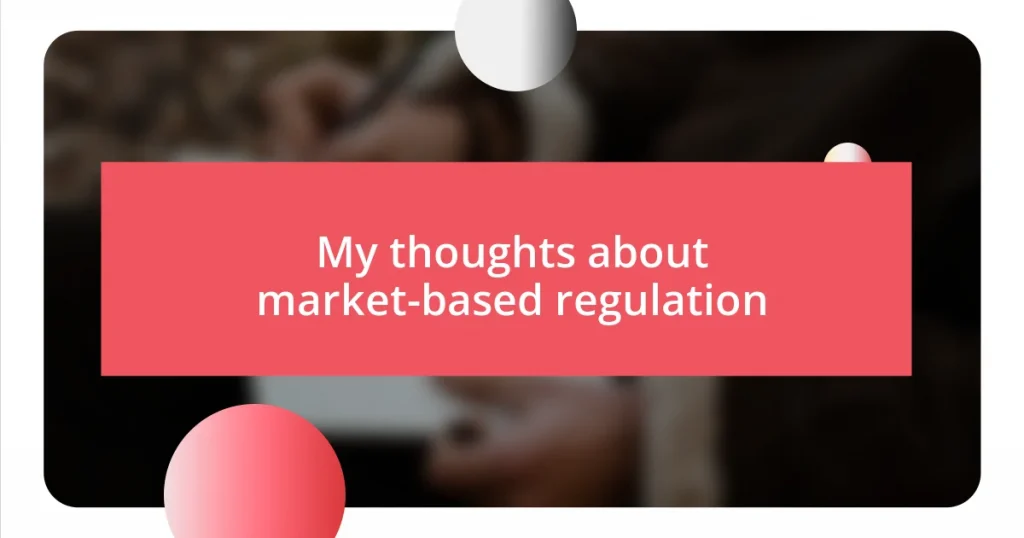Key takeaways:
- Understanding stakeholder perspectives is crucial for overcoming resistance and fostering dialogue in sustainability initiatives.
- Setting measurable goals using the SMART criteria enhances accountability and motivates teams, facilitating tangible progress in sustainability efforts.
- Engaging employees through inclusive practices and appointing sustainability champions creates a culture of advocacy and ownership within the organization.
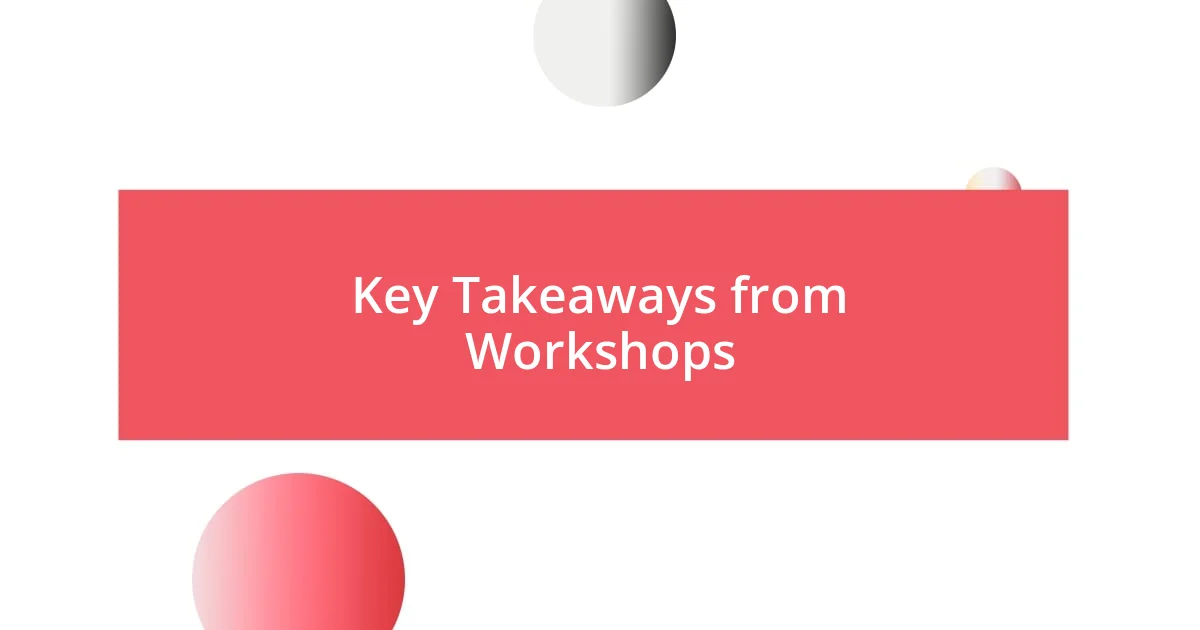
Key Takeaways from Workshops
One key takeaway from the corporate sustainability workshops was the profound impact of understanding stakeholder perspectives. I remember a moment when a participant shared their experience battling pushback from management during a sustainability initiative. It struck me how crucial it is to engage everyone, especially those who may resist change. Have you encountered similar challenges? I believe that fostering open dialogues can pave the way for smoother implementation of sustainable practices.
Another important insight was the emphasis on measurable goals. During one session, I learned about the SMART criteria—specific, measurable, achievable, relevant, and time-bound. Setting clear benchmarks not only drives accountability but also motivates team members. Have you ever set a goal and felt overwhelmed? Well, clearly defined objectives can transform that daunting task into manageable steps, making progress more tangible and rewarding.
Lastly, collaboration stood out as a central theme. The workshops highlighted success stories where companies partnered with local communities and other businesses to achieve common sustainability goals. I found it inspiring to hear how one organization not only reduced its carbon footprint but also strengthened community ties. Isn’t it fascinating how working together can amplify our efforts in ways we might not expect? This realization reinforced my belief that joining forces can unlock innovative solutions for a more sustainable future.
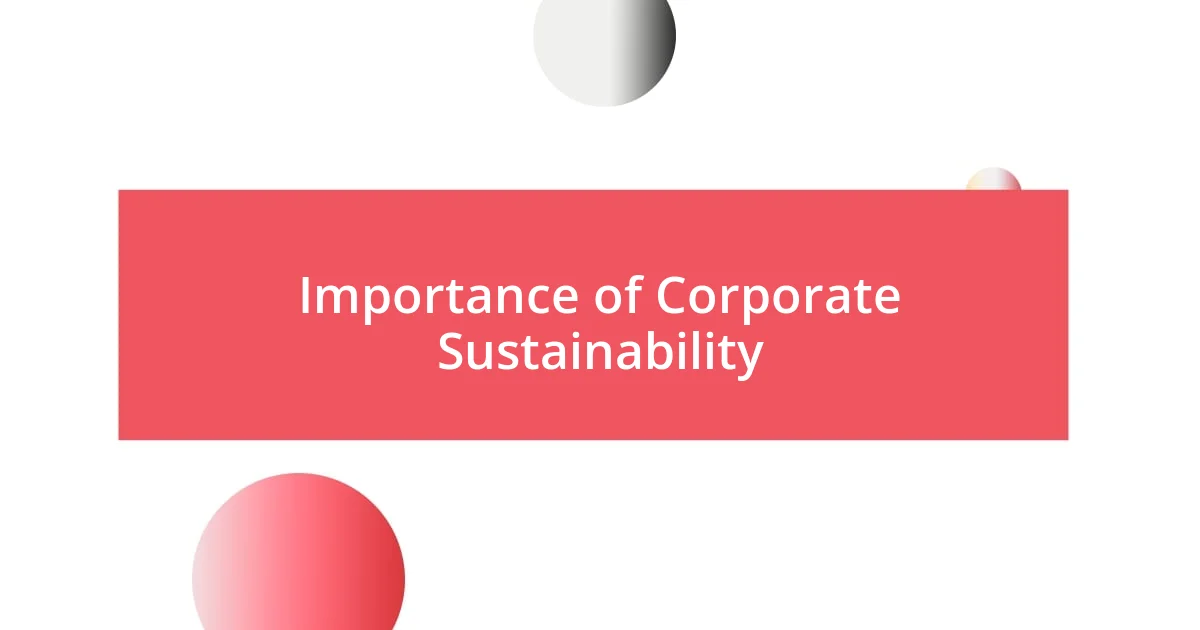
Importance of Corporate Sustainability
The importance of corporate sustainability cannot be overstated. It not only enhances a company’s reputation but also attracts environmentally conscious consumers. I recall a discussion during one workshop where a speaker passionately shared their company’s shift towards sustainable sourcing. It was heartening to see how this commitment not only improved their image but significantly boosted sales. The emotion in their storytelling really underscored how sustainability can be a powerful competitive advantage.
Moreover, I’ve learned that corporate sustainability is a catalyst for innovation. Companies that embrace green practices often find themselves at the forefront of new technologies and processes. For instance, I was impressed by a case study presented in one workshop about a firm that developed biodegradable packaging. The presenter was visibly excited, and it was contagious! This passion illustrated how sustainability can inspire creativity and drive advancements that meet both environmental and business needs.
Lastly, I can’t ignore how prioritizing sustainability cultivates a more engaged workforce. Employees feel a greater sense of purpose when they know their work contributes to a larger, meaningful cause. During a breakout session, I met a junior employee who shared his pride in working for a company committed to reducing waste. His enthusiasm was palpable, and it made me realize that fostering such an environment not only helps the planet but also energizes the team.
| Benefits of Corporate Sustainability | Impact on Business |
|---|---|
| Enhanced Reputation | Attracts conscious consumers |
| Innovation Catalyst | Drives technological advancements |
| Employee Engagement | Increases job satisfaction |
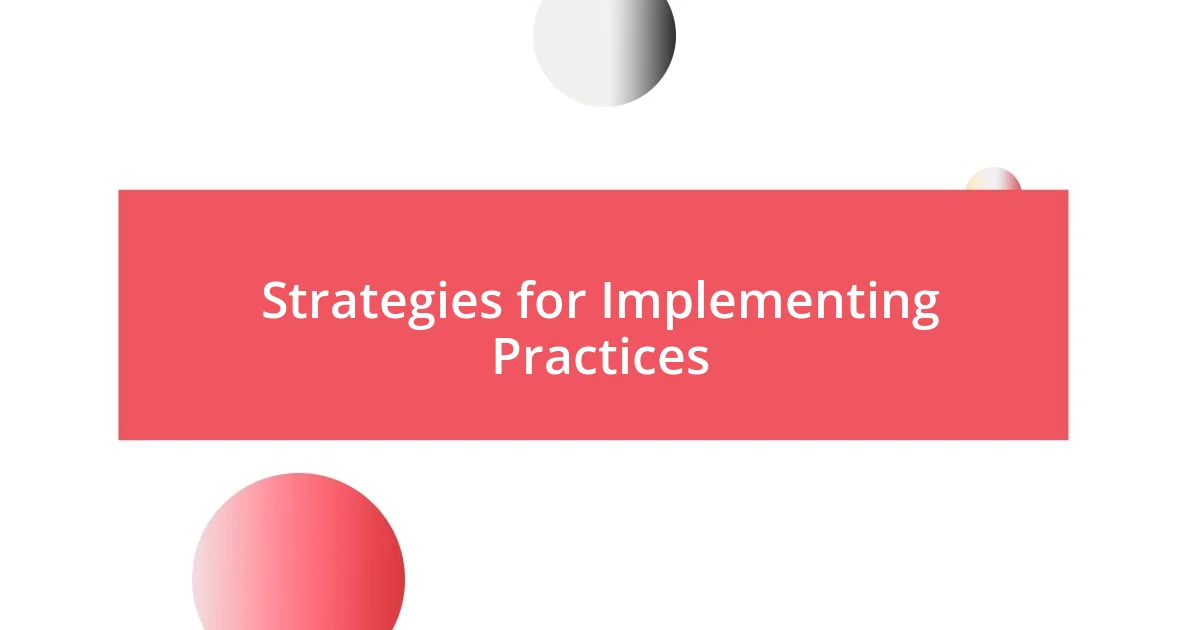
Strategies for Implementing Practices
When it comes to implementing sustainability practices, I’ve found that starting small can lead to significant change. During a workshop, I shared a story about how my team introduced a recycling initiative with just a few bins in our office. It didn’t feel like a massive leap, but the momentum it created was incredible; soon, employees were engaged, and we expanded the program to include composting as well. This hands-on approach illustrated that starting with attainable projects can build enthusiasm and lay the groundwork for more extensive changes down the line.
Here are a few strategies for implementing sustainable practices effectively:
- Pilot Programs: Test initiatives in a small department or project before a company-wide rollout.
- Employee Training: Invest in training sessions to equip employees with the knowledge they need to embrace new practices.
- Feedback Mechanisms: Create channels for employees to share their thoughts and experiences; these insights can guide future strategies.
- Incentives: Consider offering rewards, like recognition or small prizes, for teams that actively participate in sustainability efforts.
- Visual Progress: Use charts or dashboards to show the team’s progress on sustainability goals, which can drive motivation and accountability.
Navigating the complexities of corporate sustainability isn’t always easy, but I’ve learned that creating a supportive environment is crucial. I recall a discussion where someone mentioned the importance of transparency in sharing challenges and triumphs. It reminded me of when my team faced obstacles in sourcing sustainable materials; sharing our struggles fostered teamwork, encouraging innovative solutions that we hadn’t considered alone. It’s moments like these that reinforce the idea that collaboration and open communication can bridge the gap between ambition and achievement in sustainability efforts.
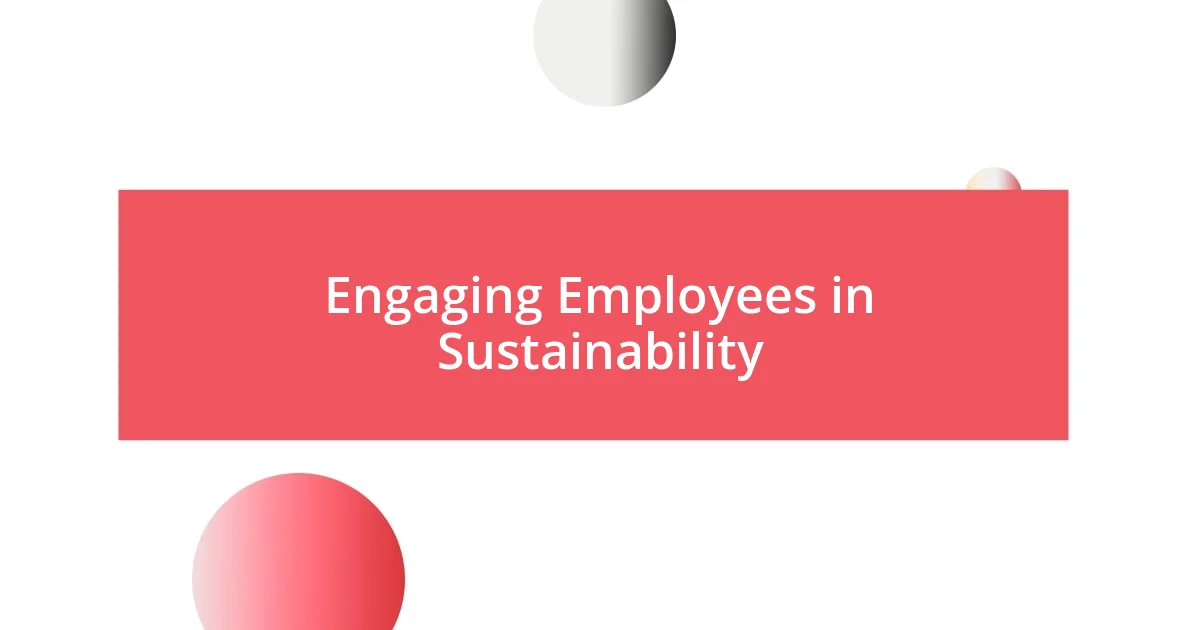
Engaging Employees in Sustainability
Engaging employees in sustainability truly transforms the workplace atmosphere. I remember a moment during a workshop when a facilitator encouraged us to brainstorm sustainability initiatives, and I was surprised to see the diverse ideas my colleagues shared. This exercise sparked not only enthusiasm but also a sense of ownership. When employees feel their voices matter, they are more likely to actively participate in and promote sustainable practices.
One effective method I’ve observed is incorporating sustainability into team-building activities. For instance, during a company retreat, we participated in a community clean-up. It wasn’t just a day of hard work; it was an opportunity to bond with colleagues over a shared purpose. That sense of community not only deepened our relationships but also reinforced our commitment to the company’s sustainability goals. Isn’t it fascinating how shared experiences can lead to a more connected and motivated workforce?
Another strategy I advocate for is establishing sustainability champions within the organization. When employees are appointed to lead sustainability initiatives, it cultivates a vibrant culture of advocacy. I once worked with a coworker who took this role seriously, organizing monthly workshops to share tips on reducing our carbon footprint. His infectious passion inspired many, and I found myself more aware of my own choices. It made me wonder: how can we ignite that same enthusiasm within our teams? Engaging employees at all levels ensures that sustainability becomes a shared vision, not just a top-down mandate.
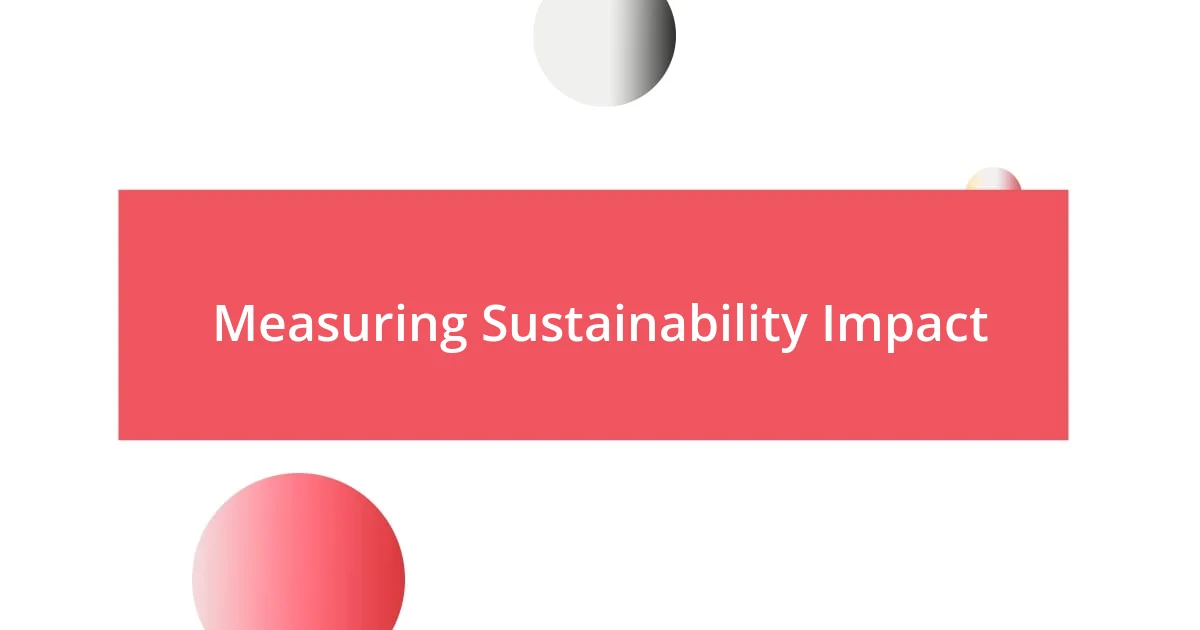
Measuring Sustainability Impact
Measuring sustainability impact can often feel like trying to capture smoke with your hands. During one workshop, we focused on the importance of utilizing data to demonstrate our green initiatives’ effectiveness. For example, I shared our experience tracking energy consumption reductions and making adjustments based on that data; it felt rewarding to quantify our efforts. Isn’t it amazing how numbers can tell a story, giving life to our sustainability goals?
One method I found particularly enlightening is the use of sustainability reporting frameworks. I recall a project where we implemented the Global Reporting Initiative (GRI) guidelines to assess our environmental impact. This structured approach not only highlighted areas of success but also pointed out where we needed to improve, creating a clear roadmap for future initiatives. It was eye-opening to see how transparent reporting fosters accountability and drives continuous improvement within the organization.
I also learned that stakeholder engagement is vital in measuring impact. I remember when our team organized roundtable discussions with stakeholders to understand their perspectives on our sustainability practices. The insights we gained were invaluable, not just in refining our strategies but also in demonstrating that sustainability is a collective journey. How do we ensure that everyone’s voice is heard in this important conversation? Establishing these connections really emphasized that measuring sustainability requires a holistic approach, encompassing internal actions and external perceptions alike.
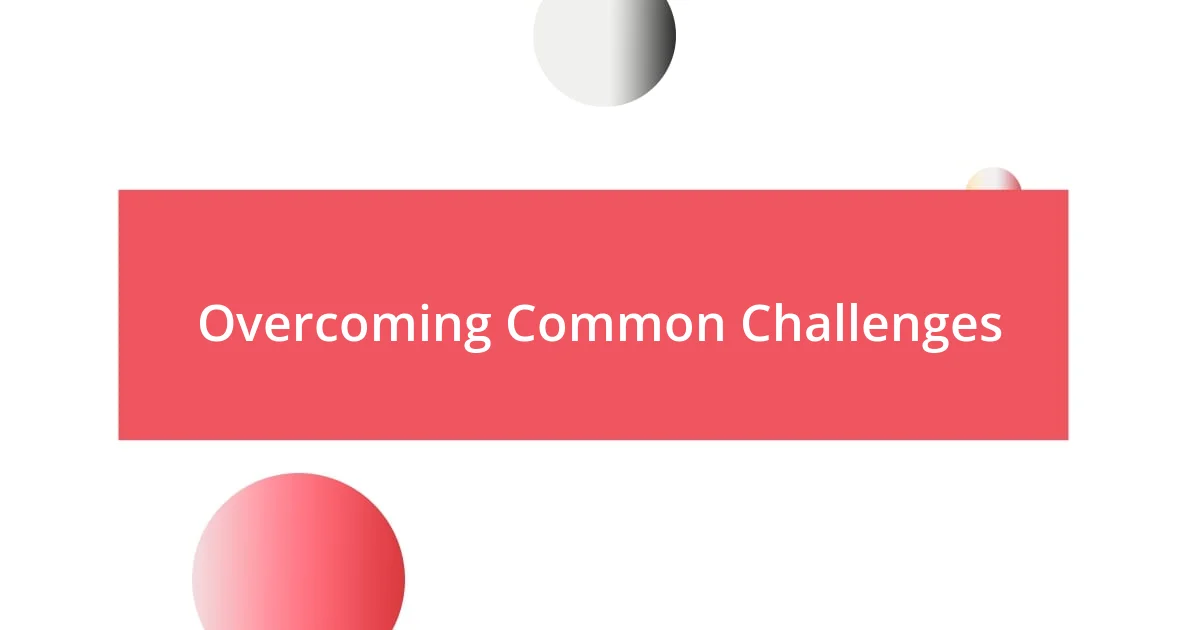
Overcoming Common Challenges
Overcoming challenges in corporate sustainability often starts with narrowing down organizational priorities. I once faced a situation where team members were overwhelmed by competing sustainability goals. By facilitating open discussions and setting clear, achievable targets, we aligned everyone’s efforts. It made me realize how important it is to ensure that everyone understands their specific role in the greater mission.
Resistance to change can be another hurdle. I remember attending a workshop where a colleague candidly shared her doubts about implementing more sustainable practices. Her concerns prompted an enlightening dialogue about balancing practicality with our sustainability aspirations. I learned that honesty about challenges fosters a culture of support, enabling teams to navigate the complexities together. Have you ever felt the weight of skepticism in your initiatives?
Empowering employees to overcome such resistance is crucial. In a previous role, we created an internal platform for sharing both successes and setbacks in sustainability efforts. The effect was transformative; not only did it build camaraderie, but it also encouraged team members to seek solutions collaboratively. I often reflect on how genuine support and shared experiences can turn challenges into stepping stones, creating a resilient network working towards our shared sustainability goals.


